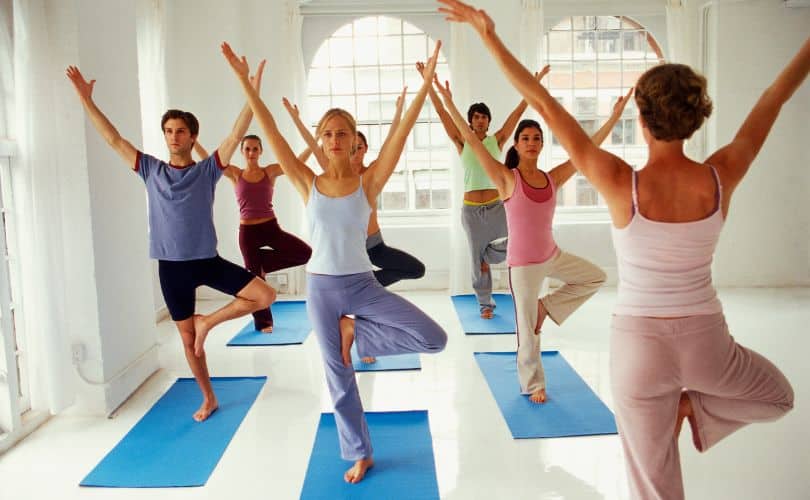Yoga Addiction Therapy in Fort Lauderdale
In 2018, the National Survey on Drug Use and Health reported an estimated 164.8 million people who were 12 years old or older battled a substance use disorder, which equates to approximately 2 out of every 5 Americans. Although the crippling statistics show the growing epidemic our country is facing, there are many methods and programs available to facilitate addiction recovery. From traditional, alternative, to complementary, more substance abuse treatment programs are focusing on treating the individual as a whole. In other words, many drug and alcohol rehabs are taking a more holistic approach to combat the disease of addiction. The holistic approach to treating addiction encompasses a variety of treatment options and tools to help the individual achieve, maintain, and cultivate sustainable recovery.
Yoga is a holistic health practice that is often considered to be an integrative medicine of the mind, body, and soul. Practicing yoga in addiction recovery is most beneficial when used in tandem with other evidence-based substance abuse treatment methods such as detoxification, individual therapy, family counseling, and 12-Step support group participation. In our addiction programs in Fort Lauderdale, you can receive comprehensive care including yoga therapy.

What is Yoga?
According to Medical News Today, yoga is a mind and body practice with a 5,000-year history in ancient Indian philosophy that incorporates various styles of physical postures. Yoga also includes breathing techniques, meditation, relaxation, and focuses attention inward to gain self-awareness. The philosophy of yoga is to convey a spiritual message and guide each session by using imagery of a tree with roots, a trunk, branches, blossoms, and fruits. Each of these specific branches of yoga represents a different focus including:
- Hatha yoga – focuses on the physical and mental branch in order to prime the body and mind.
- Raja yoga – utilizes meditation and disciplinary steps known as the “eight limbs” of yoga.
- Karma yoga – focuses on a path of service that aims to create a future free from negativity and selfishness
- Bhakti yoga – focuses on establishing devotion while also channeling emotions, acceptance, and tolerance.
- Jnana yoga – this branch focuses on wisdom while developing the intellect through study.
- Tantra yoga – this is the ritualistic pathway that cultivates ceremony or consummation of a relationship.
One of the most beneficial components of yoga is that it does not require expensive equipment or a special location. For individuals in addiction recovery, this can be especially convenient as yoga can be practiced almost anywhere as needed. The American Yoga Association reports that hatha yoga is the most common form of yoga practiced in the U.S. today. This form of yoga focuses on physical postures and breathing techniques. Generally, yoga classes are 45 minutes to 1.5 hours long and focus on achieving specific postures and breath. The flow of energy is opened through these postures in order to properly align the body. This allows the mind to open up, creating balance and harmony between the mind and body.
Yoga is not classified as a religion. However, yoga is often a highly spiritual experience as recovering individuals experience spiritual growth by connecting the mind, body, and soul. Approaching yoga, in recovery, with a specific goal in mind can help an individual decide which branch would be the most beneficial to follow.
Benefits of Yoga Therapy For Substance Abuse
Yoga is a form of exercise that not only elevates the heart rate but also helps a recovering individual clear the mind. In early recovery, it is not uncommon for individuals to struggle with anxiety, depression, and many other symptoms of post-acute withdrawal syndrome. Yoga has been proven to help mitigate the physical symptoms while also helping the individual to relax and be present in the moment.
Other potential benefits of yoga in recovery include:
- Stress relief
- Self-reflection
- Increased self-awareness
- Heightened self-confidence
- Better sleep
- Pain relief
- Increased energy levels
- Fatigue reduction
- Emotional healing
- Increased stamina, strength, and focus
- Overall wellness of the mind, body, and soul
Furthermore, many recovering addicts who commit to practicing yoga regularly experience a number of benefits specific to recovery such as:

The Mind-Body Connection
Most holistic treatment facilities offer a variety of mind-based approaches to exercise such as yoga and Pilates. Experience with this type of treatment has proven that many clients focus more on their overall health by clearing their minds and toning their bodies. Specifically, yoga focuses on bringing the mind and body together in harmony against outside negative energies. The Journal of Alternative and Complementary Medicine published a study in 2007 that focused on the efficacy of yoga in increasing gamma-aminobutyric acid levels in the brain. As a direct result, the group saw a 27% increase in GABA levels. Research such as this proves that yoga exercise can increase the chances of sobriety while also reducing cravings for drugs and alcohol.
Mitigate Cravings
Excessive use of drugs and alcohol increases the brain’s production of euphoric chemicals in the brain. Once an individual seeks recovery, the brain is already dependent on the substance to elicit these feelings. Therefore, it is common for he/she to experience cravings for the substance in order to achieve the desired effect. Exercise has been proven to have effects on the brain such as increasing the production of positive chemicals such as norepinephrine, serotonin, and dopamine. There is significant evidence that low levels of GABA and oxytocin play strong roles in the development and continuation of the vicious cycle of addiction. However, individuals who participate in regular exercise, such as yoga, tend to mitigate cravings for drugs and alcohol. This is one reason, at Agape Treatment Center, we like to incorporate yoga into our 12 step program for addiction.
Mindfulness
Many individuals recovering from drug and alcohol addiction find it difficult to focus on the moment, as they are usually struggling with feelings of hopelessness, depression, and anxiety. There is a mindfulness component to practicing yoga that is directly beneficial for individuals in recovery. We teach this coping strategy in our mindfulness and meditation program in For Lauderdale too. Yoga often facilitates a sense of self-awareness, which is often a missing element in the lives of addicts. Impulsive urges often make it difficult for recovering addicts to maintain continuous sobriety.
Yoga aids in improving concentration abilities while also easing anxiety, facilitating restful sleep, and helping the individual to focus on the present moment. The relaxing benefits of yoga can also help addicts to calm issues that are a direct result of substance abuse. Lastly, many individuals experience a spiritual connection and growth through practicing yoga. This is a vital component of recovery as outlined in many 12-step support groups.

Yoga For 12-Step Recovery at Agape Treatment Center
According to Y12SR, yoga of 12-step recovery is a holistic approach created to address the physical, mental, and spiritual disease of addiction. Addiction is often classified as a 3-fold illness of the mind, body, and spirit. The consequences of addiction often cultivate total separation and isolation. Addictive behaviors often disconnect an individual from themselves, loved ones, community, and much more.
Practicing the 12-steps of any addiction recovery fellowship teaches individuals how to cope with addiction, avoid triggers, clear the wreckage of their path, while also living sober and productive lives. Support group members admit their powerlessness over their addiction, examine past mistakes, and make amends for individuals they have wronged. The goal is to help individuals experience a spiritual awakening in order to overcome addiction.
However, yoga incorporates unity, integration, and balance. Yoga practices focus on the fine art of balancing an individual’s life while living in a complex environment. Yoga and 12-step recovery combine somatic healing with the cognitive approach to addressing addiction. Combining the physical and spiritual components of yoga with the healing effects of a 12-step recovery program addresses the mind, body, and soul of the individual while also cultivating a solid foundation for maintaining continuous sobriety. If you’re interested in trying yoga therapy for addiction, call us today and we will get you started on treatment!
- February 22, 2023
- Updated Date: December 19, 2023
Addiction Recovery Services

Stephanie Catalano is an accomplished Clinical Director at Agape Behavioral Healthcare. With a Master of Social Work degree, LCSW license, and extensive training in Rapid Resolution Therapy under her belt, she brings a wealth of expertise to her role. Her unique combination of education and experience allows her to provide exceptional care to clients and lead her team with confidence. Stephanie’s joy comes from witnessing the moments when her patients creatively connect the dots and bravely move toward reclaiming their power. Her purpose is to help individuals understand their past so they can create a future full of hope, growth, and success. Stephanie attributes a large portion of her success to the supportive culture and strong sense of community fostered by the Agape team.


